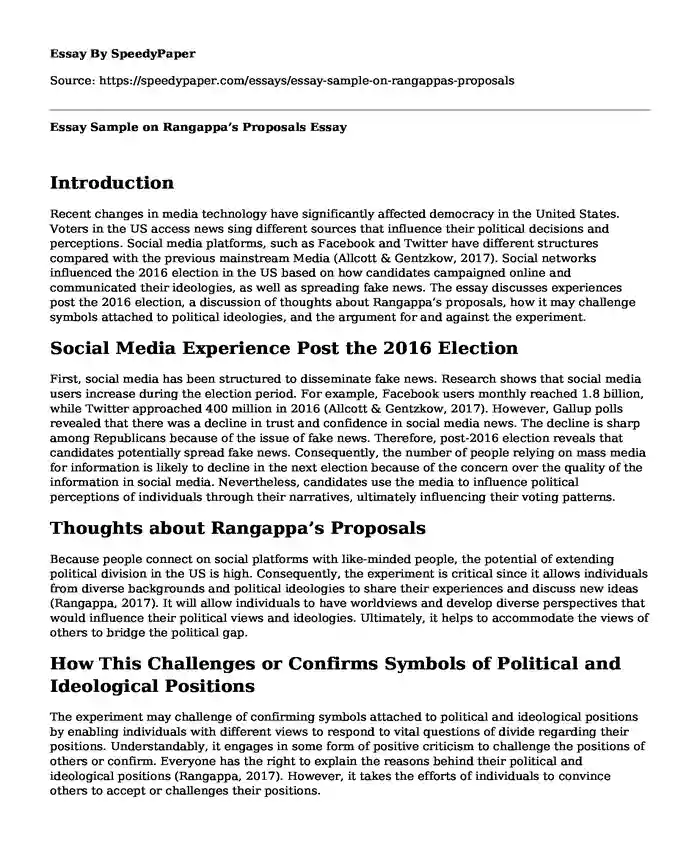
| Type of paper: | Essay |
| Categories: | Political science |
| Pages: | 3 |
| Wordcount: | 704 words |
Introduction
Recent changes in media technology have significantly affected democracy in the United States. Voters in the US access news sing different sources that influence their political decisions and perceptions. Social media platforms, such as Facebook and Twitter have different structures compared with the previous mainstream Media (Allcott & Gentzkow, 2017). Social networks influenced the 2016 election in the US based on how candidates campaigned online and communicated their ideologies, as well as spreading fake news. The essay discusses experiences post the 2016 election, a discussion of thoughts about Rangappa’s proposals, how it may challenge symbols attached to political ideologies, and the argument for and against the experiment.
Social Media Experience Post the 2016 Election
First, social media has been structured to disseminate fake news. Research shows that social media users increase during the election period. For example, Facebook users monthly reached 1.8 billion, while Twitter approached 400 million in 2016 (Allcott & Gentzkow, 2017). However, Gallup polls revealed that there was a decline in trust and confidence in social media news. The decline is sharp among Republicans because of the issue of fake news. Therefore, post-2016 election reveals that candidates potentially spread fake news. Consequently, the number of people relying on mass media for information is likely to decline in the next election because of the concern over the quality of the information in social media. Nevertheless, candidates use the media to influence political perceptions of individuals through their narratives, ultimately influencing their voting patterns.
Thoughts about Rangappa’s Proposals
Because people connect on social platforms with like-minded people, the potential of extending political division in the US is high. Consequently, the experiment is critical since it allows individuals from diverse backgrounds and political ideologies to share their experiences and discuss new ideas (Rangappa, 2017). It will allow individuals to have worldviews and develop diverse perspectives that would influence their political views and ideologies. Ultimately, it helps to accommodate the views of others to bridge the political gap.
How This Challenges or Confirms Symbols of Political and Ideological Positions
The experiment may challenge of confirming symbols attached to political and ideological positions by enabling individuals with different views to respond to vital questions of divide regarding their positions. Understandably, it engages in some form of positive criticism to challenge the positions of others or confirm. Everyone has the right to explain the reasons behind their political and ideological positions (Rangappa, 2017). However, it takes the efforts of individuals to convince others to accept or challenges their positions.
An Argument for the Experiment
The experiment is worth conducting because bridging is critical to building trust. Consistent communication and interactions improve trust and confidence levels. It is difficult for individuals with different political views to have meaningful disagreements on social platforms because users connect with individuals they agree with, including political views (Rangappa, 2017). Rangappa state, “Consistent positive interactions increase levels of trust in the relationship, so that when conflict arises, there are enough “reserves” in place to make a withdrawal, but still leave the relationship in a net-positive place (Rangappa, 2017).” It means that individuals with different views do not connect on social networks. Therefore, the experiment is worth since it helps to connect individuals with different political views to engage in positive discussions positively reducing political division.
Conclusion
Social media platforms have become the primary sources of information, particularly during the election. Due to their structure, cases of fake news are on the rise, affecting confidence and trust among voters. Nevertheless, social media platforms promote democracy in the United States. Rangappa’s experience is worth it since it encourages individuals with different ideologies and views to engage in positive discussions to enhance positive disagreements, reducing the political divide.
References
Allcott, H., & Gentzkow, M. (2017). Social media and fake news in the 2016 election. Journal of Economic Perspectives, 31(2), 211-236. https://webcache.googleusercontent.com/search?q=cache:_Q3-w1E-gDAJ:https://web.stanford.edu/~gentzkow/research/fakenews.pdf+&cd=9&hl=en&ct=clnk&gl=ke&client=firefox-b-d
Rangappa, A. (2017, October 4). The Social Experiment Facebook Should Run: What would happen if the platform matched you with people who share your interests but live outside your political bubble? The Atlantic. https://www.theatlantic.com/technology/archive/2017/10/facebook-zuckerberg-friend-swap/541881/
Cite this page
Essay Sample on Rangappa's Proposals. (2023, Dec 30). Retrieved from https://speedypaper.net/essays/essay-sample-on-rangappas-proposals
Request Removal
If you are the original author of this essay and no longer wish to have it published on the SpeedyPaper website, please click below to request its removal:
- Free Essay on the Shift from Thinking about Government to Governance
- Data Science Essay Example
- Free Essay Example: Neoliberalism on the End of Korean War
- Paper Example: Smart Cities Internationally
- Free Essay. Sexy Little Numbers
- Free Essay: Data Analysis Framework
- Unveiling the Genetic Landscape: The Dominant Role of NCAN Gene in Bipolar Disorder - Essay Sample
Popular categories




